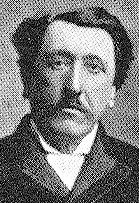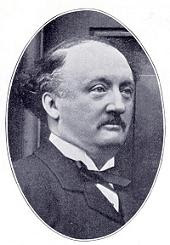 Composer and organist Edward J. Hopkins (1819 - 1901) was born in London on this day. At age eight he became a chorister at the Chapel Royal, where the boys received a solid overall musical education as well as instruction in singing (several composers already mentioned here began as choristers there). By the time he was fourteen he was playing the organ for services at Westminster Abbey, supervised by James Turle, the Abbey's organist and music director, who gave Hopkins a strong recommendation two years later when he gained his first organist position at Mitcham Church in Surrey.
Composer and organist Edward J. Hopkins (1819 - 1901) was born in London on this day. At age eight he became a chorister at the Chapel Royal, where the boys received a solid overall musical education as well as instruction in singing (several composers already mentioned here began as choristers there). By the time he was fourteen he was playing the organ for services at Westminster Abbey, supervised by James Turle, the Abbey's organist and music director, who gave Hopkins a strong recommendation two years later when he gained his first organist position at Mitcham Church in Surrey.After a few similar positions, in 1843 he came to the Temple Church in London, where his official title was Organist to the Honorable Societies of the Inner and Middle Temple. He was to remain there for fifty-five years until his retirement (he had stopped playing solo organ recitals two years earlier, on his seventy-eighth birthday). The Temple Church was known during his time for its excellent music, including the choir's singing of the psalms to Anglican chant, which the Guardian newspaper recommended to any listener, who would "hear every word distinctly pronounced, every sentence clearly and reverently enunciated," with no "slovenly hurrying or clipping of words, but all as it should be."
In 1867 Hopkins published his first hymnbook, the Temple Choral Service-Book (still in print), which contained several of his hymn tunes and arrangements as well as service music and chants. An extensive and favorable review appeared in The Church Chronicle, which concluded, with typical British understatement, "we cordially commend it to our readers' notice." Hopkins went on to serve as editor for three more major collections, The Free Church Hymn Book for the Church of Scotland, Church Praise (1882) for the Presbyterian Church of England, and the Hymnal of the Presbyterian Church of Canada.The Cyber Hymnal link above only allows you to hear a handful of his tunes. At Hymnary.org they list many more (though some of those are probably the same tune under a different name). Closer to his own time, his tunes were described as "melodious in a most winsome way" and "worth a place in any hymnal." We have already heard three of his tunes here: ELLERS, the most familiar and long-lived, as well as CULFORD and NUKAPU. This tune, ST. HUGH, first appeared in R.R. Chope's Congregational Tune-Book (1862 ed.) where it was matched with the text There is a fountain filled with blood, but I think it suits this text by Frederick L. Hosmer as well.
One thought I have, my ample creed,
So deep it is and broad,
And equal to my every need -—
It is the thought of God.
Each morn unfolds some fresh surprise,
I feast at life’s full board;
And rising in my inner skies
Shines forth the thought of God.
I ask not far before to see,
But take in trust my road;
Life, death, and immortality
Are in my thought of God.
To this their secret strength they owed
The martyr’s path who trod;
The fountains of their patience flowed
From out their thought of God.
Be still the light upon my way,
My pilgrim staff and rod,
My rest by night, my strength by day
O blessèd thought of God.
Frederick Lucian Hosmer, 1880
Tune: ST. HUGH (C.M.)
Edward J. Hopkins, 1862
There was apparently a posthumous collection of the hymn tunes of Hopkins, which I did not know two years ago when writing about him, but the reference does not mention how many tunes were included. Some continued to be used in hymnals well into the twentieth century, particularly ELLERS, and those hymnals which still include Anglican chant may have one or more by him.
As I always have to note for all these Victorian composers, Hopkins' popularity has faded over time. There is no Wikipedia entry for him, nor has anyone added his hymn tunes or anthems to the Choral Public Domain Library, unlike the music of many of his contemporaries. However, his tune OUNDLE, arranged from a melody of Orlando Gibbons, appears in the newish Harvard Univerity Hymn Book (2007), possibly more than an century after its last appearance anywhere. And just a week and a half ago, the choir of All Saints Episcopal Church in Mobile, AL sang his anthem How like a gentle Spirit (I have to note that a congregation that still sings six hymns during the summer is commendable, though I suspect they have air conditioning). So, you never know what might happen. His music is still out there, perhaps somewhat buried, waiting for someone to take an interest and dust it off.
Two Years Ago: Edward J. Hopkins














